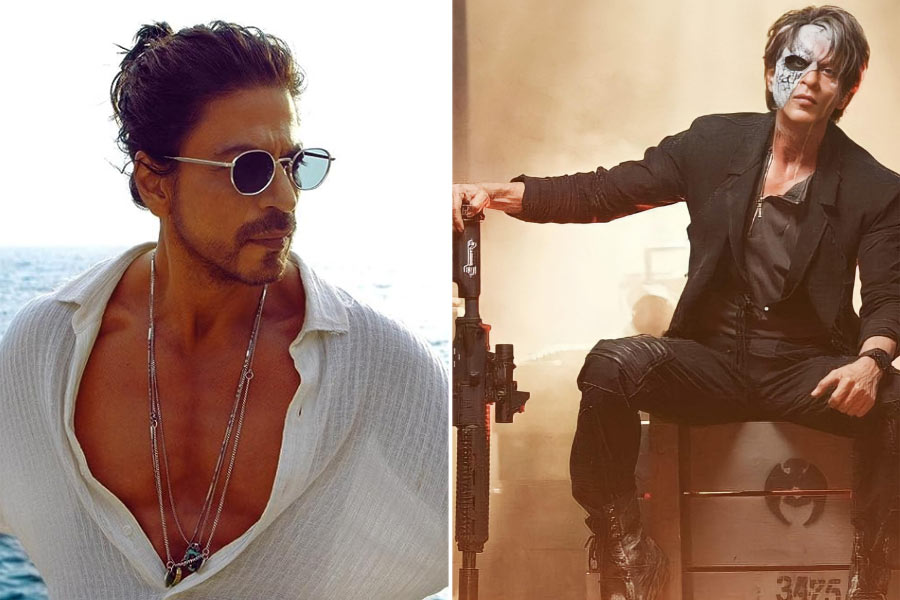‘Bete ko haath lagane se pehle baap se baat kar’ – this is without a doubt going down as the most iconic film dialogue of 2023, and in the annals of the great one-liners of Indian cinema. It deserves to. Not surprisingly, the full-house first-day crowd at the theatre I watched the film erupted at that line with a frenzy that had to be seen to be believed. I had thought that the audience had had enough whistling and clapping till that point to be spent. But, no. The filmmakers obviously still had an ace up their sleeves.
However — and it’s a big however — does one big ‘meta’ moment make a film? Even setting aside my scepticism of the term ‘meta moments’ when it comes to our mainstream cinema, does one ‘ceeti-maar’ sequence that lasts a few seconds make the rest of the film work? A two-minute trailer or a 30-second teaser, yes. But is it possible to redeem 170 minutes of bad filmmaking with one cheeky line?
Because in the end, Jawan, directed by Atlee, is a rank bad film. It is audacious, yes. It is knowingly overblown, yes. It is gleefully over the top, yes. But it is a bad film.
I have nothing against the jhakaas masala entertainers. They are the lifeblood of a film industry. But the operative word here is ‘entertainer’. Jawan is not one. It is plain tiresome. By the time it draws to a close, I was suffering from an over-the-top-action fatigue.
I had taken to Pathaan unabashedly. Pathaan was Shah Rukh Khan large. Pathaan was over the top. But Pathaan pulled it off with a panache that Jawan lacks. If Pathaan was a Patiala peg of the finest whisky, Jawan is desi tharrah. There was a method to the madness of Pathaan. Jawan is plain mind-numbing madness. Pathaan knew when and how to rein in the excess, the crazy, even as it revelled in it. Jawan has neither the finesse to pull off the excess nor the wisdom to know when to pull back.
A lot has been made of the political content of the film that supposedly makes it of the moment. Yes, I have not come across a film in recent times that picks up as many issues as Jawan does. Farmer debts and suicides, crony capitalism that sees the government write off thousands of crores of rupees in bad debts when it comes to big business (we are also informed that loans on a tractor come at 13 per cent interest while those on a Mercedes come at only eight per cent), corrupt medical practices (including government hospitals running out of oxygen and electricity in the middle of a health crisis), arms scams that lead to the death of soldiers — you name it and the writers have it. What adds spark to it all is that it is Shah Rukh Khan who is given the task of highlighting these issues. In the backdrop of how the star has been hounded by the establishment for years, it is irresistible.
But the way Jawan goes about all this harks back to the chaotic and mindless ‘political’ films of the 1980s when mainstream Hindi films started addressing issues playing out in Indian politics and predictably made a hash of it. Just take one example. In the first of these political messaging in Jawan, the Robin Hood-ish hero, with six women accomplices, has taken a train hostage. He asks for Rs 40,000 crore as ransom for the release of the hostages. There is a painfully lengthy and maudlin exposition about farmers’ debts (among his accomplices is the daughter of a farmer who committed suicide). The money is arranged. The hijackers make a getaway and presto! The money is transferred to the bank accounts of millions of farmers, one of whom is on the verge of hanging himself when he gets the news! I don’t ask for logic and rationale in a mainstream potboiler. However, the way this particular sequence plays out in all seriousness is so ridiculous as to make it a parody.
The aesthetics of Jawan — for all its hyper-kinetic cutting and slick slo-mo action with thumping background music — reminded me of, say, an Inquilaab (the 1984 Amitabh Bachchan film with that infamous climactic sequence where he guns down the entire Cabinet of ministers), Aaj Ka MLA Ram Avtar or the scores of similar themed films of the era. In fact, the couple of films that my mind kept going back to are Kamal Haasan’s Hindustani (1996) and Anil Kapoor’s Nayak (2001), both directed by Shankar. Which is not surprising once you know that Atlee was an understudy to Shankar. Jawan has the same vibes, the same approach.
Yes, we love Shah Rukh Khan, we love the grace with which he has handled what the establishment unleashed on him, we love his swagger, we love that he gets to get back at the system that was out to get him only because he was Shah Rukh Khan. But should Jawan be an exception to a critic evaluating the film purely on its merits — even as a mainstream masala entertainer — only because it casts Shah Rukh Khan? No.
Shah Rukh Khan bandaged and mummified, Shah Rukh Khan with a shiny pate, Shah Rukh Khan with a grizzled-bearded look, Shah Rukh Khan with a cigar perpetually smouldering between his lips, Shah Rukh Khan with a raspy guttural voice, a squeaky clean Shah Rukh Khan with shiny hair, Shah Rukh Khan as father and son — Jawan offers a rainbow of SRKs for the price of one ticket. So much so that the film almost overdoses on the star. Now, if only all those Shah Rukh Khans made for a halfway good film.
(Shantanu Ray Chaudhuri is a film and music buff, editor, publisher, film critic and writer)










